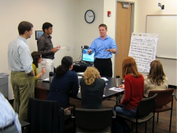 Does your boss regularly email you a high-priority assignment or question at midnight? If so, your productivity may be negatively affected. Jennifer Deal, a senior research scientist at the Center for Creative Leadership, surveyed white-collar workers and found most were tied to email13.5 hours a day, well into the evening -- some not even taking a break during dinner. What haunts such workers is the expectation that they are supposed to reply immediately, no matter the hour, or face dire consequences. This endless, reflexive checking comes from dread—not true engagement. This research (http://nyti.ms/1puscUX) discovered that continual emailing often masks poor management practices. When employees face endless questions and “cc’s” to every team member about each niggling detail, they often don’t feel empowered to make decisions. In contrast, when employees are actually empowered, they make more judgment calls and start using phone and face-to-face conversations to resolve issues quickly. Limiting workplace email is actually a trend in high-productivity Germany, where Volkswagen and Deutsche Telekom have adopted policies that limit work-related email during evenings and weekends. Can it happen in the U.S.? Only if it comes from the top. We believe that leaders should assess their use of email and make sure they are not inadvertently using it as an enabler of timidity and procrastination. We want to hear! Are you tethered to email 24/7? What changes in email policy, if any, would you like to see in your organization? Join the conversation and click "comments" below. Image Credit: Theen Moy https://www.flickr.com/photos/theenmoy/
1 Comment
 We have previously blogged about expansive body language as an expression of power and confidence. But what should your body convey when you want to encourage engagement and inspire and express confidence in your team? In Forbes (http://onforb.es/1peKVES) Carol Kinsey Goman, Ph.D. discusses the link between body language and leadership. To encourage collaboration, she says, it’s critical to pay attention when others are speaking. Leaders should adopt open body postures (no crossed arms or legs), lean forward, align their bodies with and mirror the stance of the person with whom they are speaking. She also acknowledges the importance of nodding—noting that research shows people will talk three to four times more than usual when the listener nods in clusters of three. We endorse these suggestions—and contend that they will also make you more persuasive. Be especially mindful to pay attention. Giving in to the temptation to sneak a peek at your phone (or let your mind drift away from the conversation) will result in broken eye contact and broken rapport. What body language cues do you look for to tell whether someone values and respects what you say? What body language tip would you give your boss if you could? Join the conversation: click "comments" below. Image Credit: Kevin Dooley https://www.flickr.com/photos/pagedooley/  Do you perform better at tasks you find both interesting and meaningful? You are not alone. Recounting her research in The New York Times (http://nyti.ms/1tWZtQh) Paula A. O’Keefe, assistant professor of psychology at Yale-NUS College in Singapore, describes an experiment where she and a colleague asked a group of undergraduates to work on word puzzles. “Before they began, we had them tell us how exciting and enjoyable they thought the task would be. Then they read a statement that framed the task as either personally valuable or of neutral value.” Those who read the first statement, and who also thought the task would be enjoyable, solved the most problems. It wasn’t simply because their interest made them want to work longer. Their engagement was more efficient because they were focused and “in the zone.” A follow-up study showed that this group was also the least “mentally exhausted”(as measured by their ability to squeeze a hand-grip after the task was done). By contrast, those who were uninterested in the task not only performed worse, but also were mentally fatigued. The lesson: liking our work matters! Leaders of any sort (managers, teachers, parents) should do all they can to frame work in a meaningful context—not only in terms of its immediate end but also its broader impact. Why is this work significant? What part does it play in achieving a greater goal? And—because related research shows that social engagement can foster interest—whom will it help? We want to hear. Does your performance improve when you enjoy what you do? How do you motivate others to see work as interesting and meaningful? Join the conversation: click "comments" below. Image Credit: Sebastaan ter Burg https://www.flickr.com/photos/ter-burg/  The pernicious effects of a bullying boss can replicate like a virus, says a new study in The Journal of Social Psychology (http://bit.ly/1C1qlQh). Abusive bosses not only demoralize employees in their direct line of fire, but also demoralize the co-workers of those they mistreat. The study, which examined 233 workers, looked at the effects of second-hand or “vicarious” abuse--the impact of simply hearing rumors about how badly a boss treated a colleague. Results revealed that both personally experienced and vicarious abuse had negative impacts. Second-hand abuse, like firsthand, lowers employees’ effectiveness as well as their opinion of the organization as a whole. “When vicarious abusive supervision is present,” the authors write, “employees realize that the organization is allowing this negative treatment to exist, even if they are not experiencing it directly.” What leaders permit, they promote. We agree with the study’s authors, who recommend that managers take a close look at the impact of their styles and the ripple effects of those styles throughout their organizations. Toxicity starts at the top, but then—unfortunately—takes on a life of its own. We want to hear. Have you been impacted by abusive firsthand or “second-hand” supervision? How does it affect you and your organization’s culture? Join the conversation and click "comments" on our Community of Practice Forum. |
Archives
July 2024
Categories
All
|
|
Glaser & Associates, Inc.
Executive Offices 1740 Craigmont Avenue, Eugene, OR 97405 541-343-7575 | 800-980-0321 [email protected] |
© 2019 Glaser & Associates. All Rights Reserved.


 RSS Feed
RSS Feed